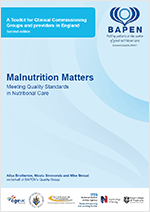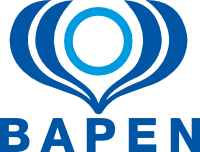
Malnutrition Matters. Meeting Quality Standards in Nutritional Care. A Toolkit for Commissioners and Providers in England
Ailsa Brotherton, Nicola Simmonds and Mike Stroud on behalf of BAPEN Quality Group.
A Toolkit for Clinical Commissioning Groups and providers in England – Second edition.
Executive Summary
- Malnutrition, in terms of undernourishment, is both a cause and consequence of disease in adults and children. It is common and affects over 3 million people in the UK with associated health costs exceeding £13 billion annually.1 It is often unrecognised and untreated, yet it has a substantial impact on health and disease in all community care settings and hospitals.2,3
- The benefits of improving nutritional care and providing adequate and appropriate hydration are immense, especially for those with long term conditions and problems such as stroke, pressure ulcers or falls. The evidence shows clearly that if nutritional needs are ignored health outcomes are worse and meta-analyses of trials suggest that provision of nutritional supplements to malnourished patients reduces complications such as infections and wound breakdown by 70% and mortality by 40%.3
- Better nutrition and hydration care for individuals at risk can result in substantial cost savings to the NHS4;with even a saving of only 1% of the annual health care cost of malnutrition, amounting to £130 million annually.1 Recent guidance from the NICE identifies better nutritional care as a large potential source of cost savings to the NHS5 and CCGs should use the NICE data to calculate potential cost savings for their local Trusts. Nutrition and hydration were also identified in the eight ‘high impact’ actions6 and have been a key focus in the delivery of harm free care in the Department of Health QIPP Safe Care Work Stream programme, recognition that improvements in nutrition and hydration care will have substantial positive impact on all 4 key harms
- It is crucial when redesigning nutritional care, to consider the overall health costs associated with malnourishment and dehydration. For example, although it is tempting to create a simple target to reduce the prescribing costs of oral nutritional supplements (ONS), which have risen steeply in recent years, ill thought out measures to do so will be detrimental to some individuals and may result in increased overall costs. Properly planned nutritional care will reduce costs from inappropriate use or wastage of ONS but will also identify more individuals who will benefit from them. However, since the health care costs associated with malnutrition are primarily due to more frequent and expensive hospital in-patient spells, more primary care consultations and the greater long-term care needs of malnourished individuals, even a net increase in use of ONS, enteral tube feeding and parenteral nutrition, will be more than offset by cost savings since the current costs of these nutrition support modalities only amounts to about 2% of overall malnutrition related costs.4 It is imperative to take a holistic view of costs rather than attempting to make savings in one area that will result in increased costs in another.
- Providing good nutritional care is therefore a matter of quality, clearly delivering against all elements of fair, person- centred, safe and effective care7 as well as ensuring equality, improved outcomes and best patient experience.
- Improved nutritional care is dependent on effective management structures to ensure joined up multidisciplinary care pathways across acute and community settings. Clinical leadership, innovation and continual improvement are fundamental to the delivery of high quality nutritional care.
- NICE guidance on Nutrition Support in Adults8 sets out clear recommendations for nutritional screening in hospital and community and the development of personalised nutritional care pathways for patients at risk. There are also national minimum standards for food provision in care homes9, patient experience surveys10 and annual assessments of nutritional care in hospitals by the Patient Environment Action Team (PEAT),11 and the Royal College of Nursing (RCN) has published a position statement on malnutrition in children and young people.12 Many other organisations including the Council of Europe, the Department of Health, NICE, the National Patient Safety Agency (NPSA), the National Association of Care Catering (NACC), the Royal College of Physicians (RCP), and the RCN also recognise the importance of screening for malnutrition and treating all those at risk. The Care Quality Commission (CQC) produced guidance for healthcare and adult social care services on ‘Essential standards of quality and safety’ which include ‘meeting nutritional needs’ and are undertaking programmes of inspection and reinspection against core standards to ensure dignity and nutritional care are improved. These are much more detailed than the previous core standards.13
- BAPEN has produced a number of reports on the causes, consequences and health economics of malnutrition as well as national surveys on the prevalence of malnutrition and the use of nutritional screening in hospitals, mental health units, care homes and sheltered housing. The charity has also contributed to national government and NHS strategies, such as the Nutrition Action Plan14 and the NHS core learning15 units on nutrition. We are therefore in a good position to provide commissioners and providers with information on nutritional care and standards.
- The BAPEN Nutritional Care Tools in this document were developed in consultation with many organisations including all the Core groups that make up BAPEN. The generic issues that surround commissioning for adults and children are similar but some specifics of childhood nutritional needs and monitoring are different with issues such as poor parenting needing to be addressed. Child specific contributions were therefore made by the Nutrition Working Group of the British Society of Paediatric Gastroenterology, Hepatology and Nutrition (BSPGHAN) and the document contains a specific appendix focused on paediatric issues and transitional care to adult services.
- The principles underlying the tools are that potentially vulnerable individuals should be screened for malnutrition and that those identified as at risk should be offered person-centred nutritional care plans appropriate to their needs. To achieve this all care staff must understand the importance of nutritional care and be trained to identify those at risk, a training need that can be met by e-learning modules available from BAPEN. All health or social care organisations must also have management structures in place to ensure best nutritional practice.
- This BAPEN Toolkit is based on world-class commissioning competencies16 and enables commissioners and providers in local authorities, primary care organisations, hospital trusts and foundation hospitals to include best nutritional care when commissioning / redesigning all care services across all health and care settings. It will help service providers to include nutritional care in the development of new business cases and support them in collecting the data needed to prove they meet nutritional quality standards and recommendations. It will also assist commissioners to set appropriate and achievable key performance indicators (KPIs) and to effectively contract and monitor services against an appropriate quality specification.
- The BAPEN Toolkit contains guidance for commissioners and providers on defining the relevant, measurable outcomes related to nutritional care within services in order to gain value for money, a summary of national nutritional care standards and recommendations and the following tools:
- Tool 1: Assessment of population at risk of malnutrition – Guidance on quantifying the numbers in the local population likely to be malnourished or at risk of malnutrition and hence the scale of need for nutritional care.
- Tool 2: Assessment of current screening and provision of nutritional care – Guidance on the assessment of current levels of local nutritional care provision.
- Tool 3: Development of nutritional screening, assessment and care pathways – Guidance on how to ensure that nutritional care pathways meet agreed standards and recommendations, based on available evidence for effective and efficient identification of malnutrition in patients and subsequent management.
- Tool 4: Education and training: Knowledge, skills and competencies of staff involved in nutritional screening, assessment and care planning – Guidance to ensure that staff are appropriately trained to deliver high standards of nutritional care that are appropriate to the needs of individuals in health and social care settings.
- Tool 5: Service specifications and management structures for nutritional care – A checklist to assist teams in developing specifications for nutritional care within services for adults and children across all local settings.
- Tool 6: Quality frameworks for nutritional care – A framework to check that organisations involved in providing care to the local population put nutrition at the heart of that care.
- Tool 7: Quality indicators, monitoring and review – Guidance on measurable markers of quality in nutritional care and information to assist in the development of data collection systems embedded in routine care wherever possible (rather than systems requiring specific ad hoc audits). The markers will also permit confirmation of quality and will enable commissioners to set appropriate KPIs, ensuring value for money.
- Tool 8: How good is the nutritional care you deliver? – Understanding your current position: BAPENs ‘At a Glance Guide’ for a baseline assessment.


